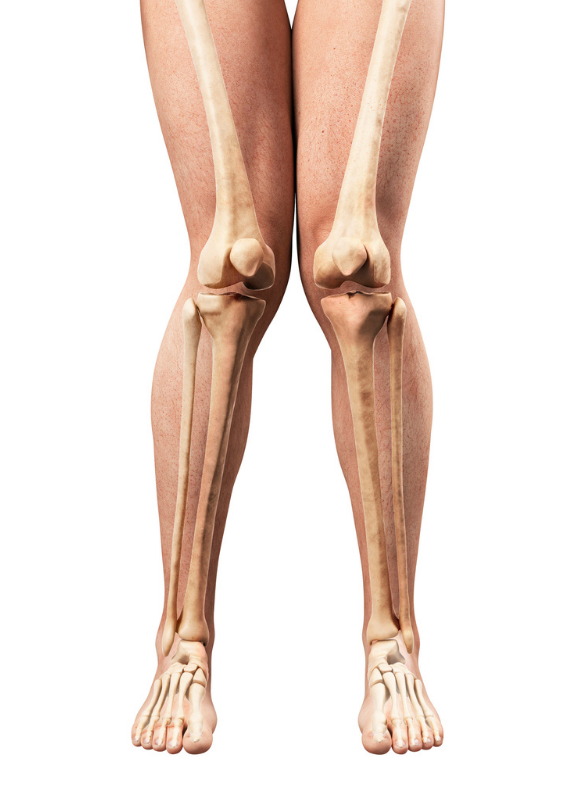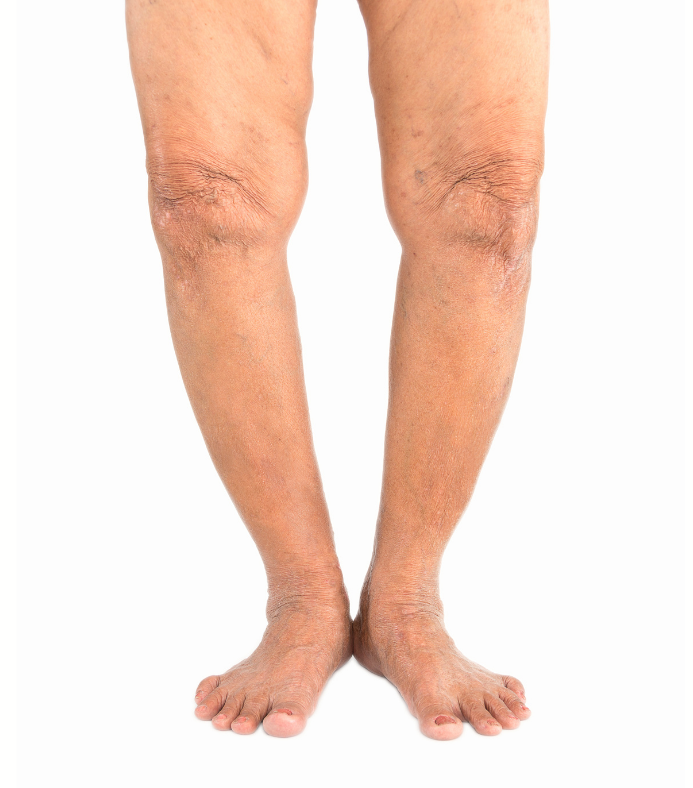As kids grow, their legs, joints and bones go through many changes. Some of these changes, including knock knees and bowed legs, can be normal variations in infants and toddlers that they’ll grow out of. We usually expect these conditions to resolve by the time kids are six years old at the latest.
Knock Knees

Medically known as genu valgum, knock knees are when the knees turn in to face one another, which means that they may knock against one another during walking. For some, their knock knees may be severe and pronounced, and for others, it may only mildly affect them. If the knees are knocking against each other with every step, this may put the child at risk of tripping, falling, pain and other injuries to the knees.
If knock knees persist beyond six years old, bony conditions including osteomalacia and rickets should be considered. Other factors may contribute to the development of knock knees, including loose or hypermobile ligaments, knee injury or infection, deficiencies in calcium or Vitamin D, and childhood obesity.
Bow Legs

Bowed legs are known as genu varum, and you’ll notice them because the legs and knees are curved outwards while the feet are still together. It is most often associated with the baby’s position in the womb. When bowed legs persist past the age of three or four, it is a sign that there may be complications or difficulties with walking or running as the child grows, or that they may be more vulnerable to arthritis later in life.
Contributing factors to bowed legs include rickets, Blount’s disease, a knee injury like a fracture that doesn’t heal properly and abnormal bone development. If this condition persists beyond the age of six, further investigation and treatment is indicated. We expect bow legs to resolve faster than knock knees, often around the age of four.
Treating Knocked Knees & Bowed Legs
As these conditions typically resolve before the age of six, if you are noticing them starting to naturally reduce in severity, then this is a good indication that everything is heading in the right direction. In this case, we can help you manage any problems that develop as a result of the knee and leg positions such as knee pain and discomfort when walking and running.
At times, these positions are exaggerated by other biomechanical problems, so we’ll always conduct a comprehensive assessment so you know exactly what’s going on and the best way forward for your child. Our goal is always to help keep your child happy, healthy and pain-free as much as possible.
As muscles and ligaments can also be affected by these positions, we may use stretching and strengthening programs, orthotics and good, stabilising and supportive footwear to help manage your child’s symptoms.
If knock knees or bow legs continue past the age of six and into the early teenage years, it’s important to rule out any underlying bone conditions or deficiencies, and treat these effectively. Where we suspect this may be present or warrants further investigation, your podiatrists will refer your child to see the right person at the right time.
Frequently Asked Questions On Knock Knees
At what age do knock knees typically appear?
Knock knees are most commonly seen in children aged 2 to 5 years. In many cases, they then gradually improve as the child grows older and their leg bones continue to develop.
When should I be concerned about knock knees in my child?
If knock knees persist beyond the age of 7 or 8, or if they are severe and causing pain or difficulty with walking, bring your child in for an assessment with our podiatry team.
Can knock knees be treated without surgery?
Absolutely. Almost all cases of knock knees don’t require surgery. Your podiatrist will create a conservative (non-surgical) management plan that addresses every aspect of the problem – including if the knock knees are causing tripping and falling. Surgery is typically considered a last resort for severe and persistent knock knees that do not respond to other treatments. It may be necessary in cases where the condition is causing significant pain, deformity, or functional limitations.
Are knock knees a sign of rickets or other medical conditions?
Knock knees can be associated with certain medical conditions, including rickets, skeletal dysplasias, and metabolic bone disorders. However, they can also be a normal variation in some individuals.
Can adults develop knock knees?
Yes, adults can develop knock knees due to various factors, including arthritis, ligament injuries, or gradual wear and tear on the knee joint. These cases may require different treatment approaches than those in children.
Can knock knees be prevented?
Knock knees related to genetics or natural growth may not be preventable. However, maintaining a healthy lifestyle with proper nutrition, exercise, and avoiding excessive stress on the knees can help reduce the risk of developing knock knees.
What complications can arise from untreated knock knees?
Untreated knock knees can lead to joint pain, arthritis, and gait abnormalities in the long term. It may also affect a person’s self-esteem and body image.
